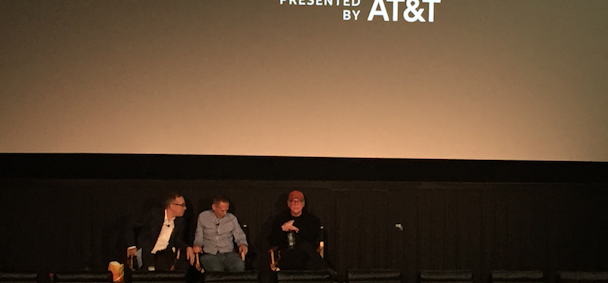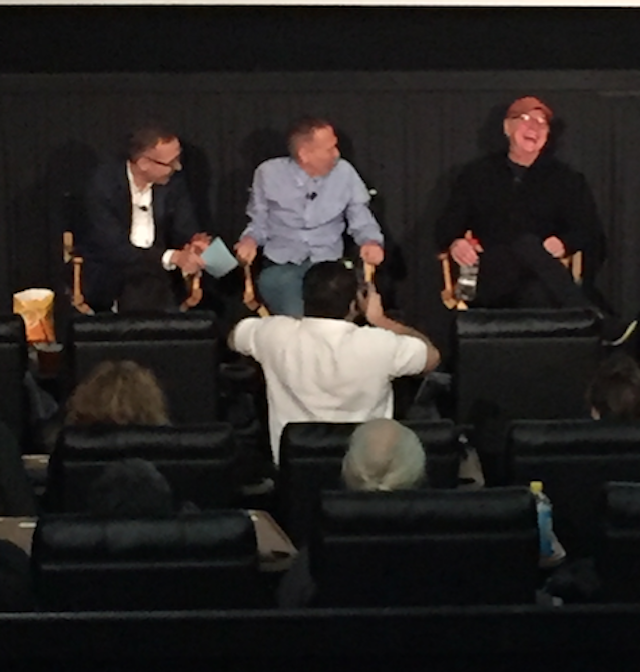Gilbert Gottfried and Barry Levinson talk storytelling during live podcast at Tribeca Film Festival
How we approach dialogue has particular importance in the storytelling process, especially in the films of director and screenwriter Barry Levinson. Levinson sat down with actor and comedian Gilbert Gottfried in New York as part of the Tribeca Film Festival presented by AT&T.

Frank Santopadre (l), Gilbert Gottfried and Barry Levinson
“The common, normal pieces of dialogue are the most important,” said Levinson during a live episode of Gilbert Gottfried’s Amazing Colossal Podcast with co-host Frank Santopadre. What Levinson meant by that is that how we talk in normal, everyday conversation is key to how characters interact, and ultimately reveal their motivations.
“We’re always talking sideways,” he said, especially men, who don’t directly ask how someone is doing; they skirt around the issue and talk about other things. This was the key to how his movie Diner resonated with so many people, though initially the Hollywood machine didn’t get it.
“A lot of people didn’t get what was on the page,” he continued, explaining that the normal, everyday dialogue didn’t appear to be working since it didn’t inherently move the plot along. But Levinson knew that it was that dialogue that would speak volumes for the characters. It ended up influencing a generation of television and movie makers, including the show ‘about nothing’, Seinfeld.
“It’s simple, but it’s about everything, but it’s about nothing,” Levinson stated, noting that every Diner character had a dilemma and that plot would be secondary to the character development, which was all in the dialogue.
Gottfried, who is the subject of a documentary at the festival – 'Gilbert' – took a back seat to Levinson, asking pointed questions about his career and art and only making jokes when necessary.
“Fuck you, you ruined my career,” joked Gottfried to Levinson, saying that the director hired him for a “crappy pilot – ‘Toast of Manhattan’” – that was a behind the scenes of a variety show that quickly disappeared. Gottfried was able to sing the entire theme song to the show in his trademark raspy voice.
The evening, however, was full of respect as Gottfried and Santopadre let Levinson have a career retrospective.

A great story is a great story, and Levinson has told plenty in his long career. He started by recounting his early days, when he moved after college from his hometown of Baltimore to Manhattan Beach, California, where he was admittedly aimless. He was dragged to acting classes in Hollywood by his friend and roommate, George Jung. Levinson attributes his success to those classes, and to Jung for making him go initially.
From there, he hooked up with Craig T. Nelson and formed a comedy team, where he used his improv training and writing skills. He also wrote for the Lohman & Barkley show in LA, where he and four other writers had to fill 90-minutes of showtime, which sometimes resulted in crazy sketches, like one where lawyers were in court with live pigs (for no particular reason). “The pigs were out of control…the laughter was so loud. It was supposed to run two-and-a-half minutes but it ended up running 14 minutes.”
Levinson kept climbing the ladder as a writer, first for the Marty Feldman Comedy Machine, then the Carol Burnett Show, then for comedy legend Mel Brooks and his films Silent Movie and High Anxiety (where Levinson also played the hilarious psychotic bellboy who stabs with a newspaper). Brooks was instrumental in Levinson’s career as a writer and director.
“It was one of those great experiences. He included you not just in the writing but the casting, (the shooting and the editing),” he said, adding that Brooks may be the “funniest man ever”.
Brooks was the one who heard the stories of Levinson growing up in Baltimore and his experiences at the local diner, and encouraged him to make it into a movie. Eventually that got done, with Levinson hiring comic Paul Reiser without an audition because he liked the cadence of his voice. After that groundbreaking movie, Levinson took his career to the next level, making films like Tin Men, Good Morning Vietnam and Rain Man, the latter of which won him an Academy Award for Best Director.
Through it all, however, he remembers his time with George Jung as the best story he’s ever told. What makes it so is that he said he lost touch with Jung after Levinson moved closer to his acting classes, while Jung dealt small amounts of pot and other odd jobs.
“I never saw George again,” he said. But Jung did eventually make a name for himself. “I went to see the movie Blow in 2001,” he said, adding that it was that George Jung who was the subject of the movie, played by Johnny Depp, as a man who got caught as one of the major cocaine smugglers and dealers in the 70s and 80s.
“That was the George responsible for everything that took place! I’d have to write that as the top…and 100% true. It deals with everything – career, madness, insanity and friendship all mixed into one. If I didn’t go to that acting school with George, none of the things that took place after would have happened. I didn’t know it at the time, but that one step…by step by step, (took me) in another direction.”
Levinson also recalled how his father never really understood what he did in the entertainment industry. “Here’s how he would relate to it. He’d say ‘how are you doing?’ And I’d say, well, I’m writing but I haven’t sold anything. He’d say ‘well, at least you’ve got inventory.’”
Through it all, Gottfried’s signature cackle of a laugh punctured the evening and made for a very listenable time of trying-to-make-it-in-Hollywood stories.

